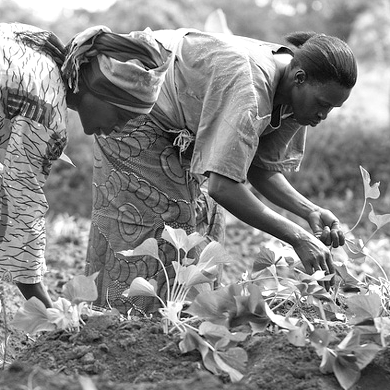Difference between revisions of "Africa News - Food Security"
From Akvopedia
(Published from sandbox) |
(No difference)
|
Latest revision as of 02:34, 5 February 2016
| December 16, 2015 Therapeutic foods make all the difference in Uganda Almost half of all Ugandans are food- energy-deficient. Children, pregnant women, breastfeeding mothers and those living with chronic illnesses, especially HIV/Aids and tuberculosis, suffer the most. | |
| December 8, 2015 Is Food Security Breaking Through in Paris Climate Talks? One of the most promising new ideas at the Paris climate talks so far, is the French government's "4 pour mille" initiative. The name 4 pour mille (or 0.4%) refers to the annual increase in soil carbon, which would offset atmospheric carbon emissions. | |
| December 7, 2015 Kuwait Launches Initiative to Advance Food Security, Health and Education Development Across Africa Kuwait today launched a major initiative to spur sustainable development across Africa with an annual prize recognizing the best research or development advances in food security, health and education that contribute to significantly solving development challenges facing African nations. | |
| December 6, 2015 African Nations Aim to Restore 100 Million Hectares of Land by 2030 Ten African countries have committed to restore 31 million hectares of degraded and deforested land, under a new push to make 100 million hectares productive again by 2030. | |
| December 2, 2015 How African countries are addressing soil infertility issues One of the partners is Alliance for Green Revolution in Africa (Agra), which focuses on soil health as critical for biodiversity. The programme aims at reaching four million smallholder farmers in 13 countries where it is being implemented. These include Kenya, Uganda, Tanzania, Ethiopia, Rwanda, Zambia, Malawi, Mozambique, Ghana, Mali, Niger, Nigeria and Burkina Faso. | |
| August 18, 2015 The Future of Food Looks Bad for East Africa—but These Farmers Aren't Giving Up By planting legumes and trees that return nitrogen to the soil, collecting rainwater in lined water-harvesting pans, and diversifying their farms with a number of crops and animals, they’re able to ensure food and economic security despite increasingly erratic harvests. | |
| June 11, 2015 Smallholders gaining from nitrogen-efficient maize Shobona grows a nitrogen-use-efficient (NUE) type of maize. The variety was developed by the Improved Maize for African Soils (IMAS) project, an alliance led by the International Maize and Wheat Improvement Center (CYMMIT). | |
| May 11, 2015 Women, tech key to curbing food insecurity in Africa “I think technology is an even bigger hindrance for women than land,” Kiamba told me, reasoning that more women have access to land for food production even if they don’t have ownership. |

